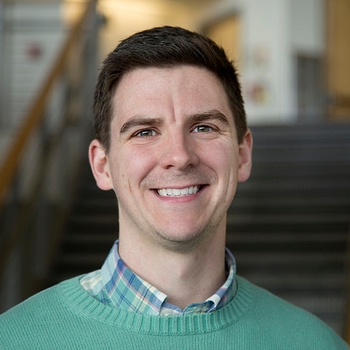
Aaron Morris Receives DARPA Young Faculty Award
Award honors rising stars in research

Award honors rising stars in research
Congratulations to Aaron Morris, Assistant Professor of Biomedical Engineering, on receiving the Defense Advanced Research Projects Agency (DARPA) Young Faculty Award.
The objective of the DARPA Young Faculty Award (YFA) program is to identify and engage rising stars in junior research positions, emphasizing those without prior DARPA funding, and introducing them to U.S. Department of Defense (DoD) needs and DARPA’s program-development process.
“I am very excited and honored to receive this award,” Dr. Morris said. “I’ve always thought the DARPA YFA projects were extremely innovative and had real potential to change how we as a society do things. I’m flattered that DARPA liked our proposal and we are now included in that excellent company. The funding from this award will be a huge jumpstart to our young lab and the cutting-edge science both my lab and the Tessier lab will do will lay foundations for collaborations for years to come.”
The YFA program provides funding, mentoring, and industry and DoD contacts to awardees early in their careers so they may develop their research ideas in the context of national security needs. The long-term goal of the YFA program is to develop the next generation of academic scientists, engineers and mathematicians who will focus a significant portion of their career on DoD and national security issues.
The mission of the agency is to make sure that the United States is at the forefront of technology, according to Dr. Morris. “DARPA is part of the Department of Defense,” he said. “Some of the work is very defense focused, and some of it is more sort of technology focused, with a goal of trying to advance issues viewed as critical for the United States. For example, the biotechnology topics are related to defense, but may have benefits for the health of civilian populations as well.”
DARPA provides a list of about 40 potential focus areas in which they are interested. “You can propose something for one of those specific topics, so the one I applied to was about sepsis,” he said. “The organization was looking for a biomimetic prophylaxis for sepsis.”
“Sepsis is a disease of immune dysfunction caused by an infection, usually an infection getting particularly large and problematic, Dr. Morris added. “This is often, although not always, when the infection reaches the bloodstream. Sepsis is an overzealous systemic response to an infection and the results can be serious, including leading to death.”
Globally, sepsis affects about 48 million people. In the United States, about 270,000 people die from sepsis every year. “This is clearly a big problem, and it’s a broad problem,” Dr. Morris said. Sepsis is often acquired in hospitals. “It’s also common in soldiers,” he added. “For example, some sort of shrapnel may puncture the body, hitting the digestive tract, leading to a massive infection from bacteria and other microbes that are normally contained in your system. This is just one possible scenario that could lead to sepsis. One of the things that’s really, really tricky about it is that every hour of delay in diagnosis increases the mortality between 6% and 8%, so we need to diagnose it very quickly. If we diagnose it quickly, we can usually treat it.”
Although medications are available, people have to have the ability to get to a clinic to receive a diagnosis and begin treatment. Beyond that, antibiotics may not be always be effective due to resistance.
DARPA’s goal was the proposal of a “big idea” in the form of a prophylactic tool that can be administered in advance to prevent sepsis. “Ours is cell based, but something that you could give to people that would be a preventative,” he said. ”I was interested in this because we were already working on related technologies for autoimmune disease. DARPA’s whole model is built on high-risk, high-reward kinds of projects. They encourage projects to be very ambitious, but that also means they are risky.”
Peter Tessier, the U-M Albert M. Mattocks Professor of Pharmaceutical Sciences, College of Pharmacy, and Professor of Chemical Engineering and Biomedical Engineering, College of Engineering, is a collaborator on this proposal. “We were already collaborating on some work and decided that we could take that and use it to help us get this sepsis grant,” Dr. Morris said. “We proposed to do this research in two parts. One is that the first part is focused on detecting sepsis in different ways–building new living systems that are able to detect sepsis and alert us. The next thing is to close the loop by having the system itself deliver therapeutics autonomously so that there’s no need to even go to a clinic. It depends how far the project goes, but if we’re able to get all the way to the end, we would be able to do all three years and successfully close that loop. The impact could be huge.”